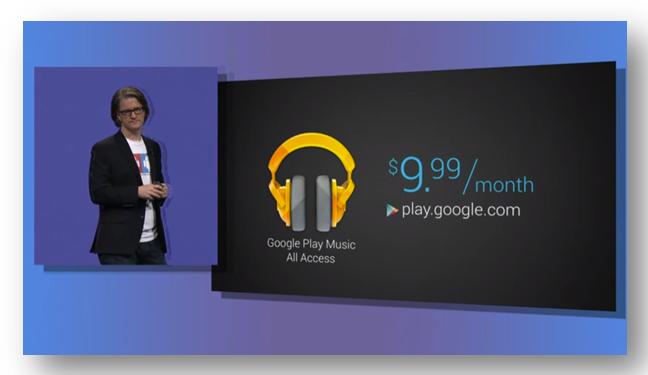If you’re excited to usher out 2013, join the party. As we head into the new year, it’s a great time to reflect back on the year past, and that’s what we’re doing with JacoBLOG. We’ve selected some of our most-read entries from the last 12 months, and this is one of my favorites. It’s a familiar theme around these parts – music formats and the personalities who make them (or made them) great. – FJ
We’ve all been there.
You wake up one day – or 5 o’clock rolls around – and it turns out that one of your competitors has changed formats.
And now they’re coming right at you.
They’re playing your music, with your value proposition, and your liners. And they’re commercial-free so even your core fans will try them out. And it also turns out that this is no ma and pa company – it’s one of the biggest corporations in the business and they’re gunning right at your heart.
It’s a sick feeling because brand managers work very hard to establish their turf, their position, and their difference. And when another capable player with assets galore comes on the scene, it signals fragmentation and the pain that comes with it.
That has to be how Tim Westergren and Daniel Ek probably felt last month when Google announced its new Google Play Music All Access (OK, they’ve got to tighten up that name) – another of these all you can eat music subscription services where the world’s music library is available to you to create infinite numbers of playlists. Maybe it was Rhapsody that was most uncomfortable because they’ve never cracked through and now good old Google has designs on this space. And these pure-play incumbents may go through that collective nausea again if the rumors that Apple may be starting their own music service are true. You have to believe that an Apple-created iRadio would be an instant problem for Pandora, Spotify, and others pure-plays.
Google has lots of assets – the Android platform, apps, a ridiculously large “cume,” and other tools that can be integrated with music. And Apple has a few things going for it as well, from its millions and millions of customers to iTunes to its incredible media brand equity.
For consumers, this is yet another signal that music has been commoditized and that it’s no longer necessary or even practical to buy music – whether you still do this physically or you’ve totally moved over to the digital format.
But for radio, it’s a whole other thing. Any consumer can now have 3 million songs in their pocket or purse. It’s possible to enjoy “radio” that is created based on your mood, your tastes, or the playlists of your friends.
And yet as more and more of these digital music services come along, radio may actually stand apart in a unique but very precarious way.
Every digital pundit and blogger believes that radio’s music stations are on the endangered species list as these smorgasbord services proliferate. But if that means that radio will essentially become a spoken word medium, that’s a tough one to swallow (especially as Talk/Radio now finds itself walking the plank because of advertiser problems and its myopic view of consumers). The music stations that manage to survive will suffer by the lack of competitors around them. And are there really enough spoken word formats to fill up a market’s worth of radio choices? Do markets really need three sports radio stations or news/talkers?
So will music formats really be dead on broadcast radio? Is there any truth to the theory that music stations will have no value when consumers can migrate to one of the aforementioned services that lets them listen to any song they like anytime on any device anywhere they go?
Well, yes, if radio continues to go down the path of fewer personalities, more voicetracking, less talk, no local program directors, formulaic playlists, no audience interaction, local coverage only during disasters, zero curation, and simply no fun.
Those tactics may work just fine in the PPM world. But consumers don’t live in that neighborhood. They’re part of a much larger social community. And while virtually all the world’s music resources and songs are now available at the click of a mouse, don’t people need help and guidance in order to discover and learn what’s worth listening to?
Consumers need reviewers, guides, mavens, and entertainers we trust who know us and know our tastes. This is true for restaurants, hotels, cruise ships, chain saws, and cars – and it’s also true for music.
We need help, guidance, and hand holding because the dark side of all this choice is that too many options can be overwhelming. When you have everything at your digital fingertips, it can become intimidating and stressful. And there’s a good chance that, ultimately, consumers will be turned off by all these options.
 That’s where radio ought to come in – to reassert its historical value to consumers and help them better understand and enjoy the music that matters in their lives – whether it’s an album produced in Los Angeles or the UK or a great song that’s been recorded right here in town by a local band that’s worthy of hearing and seeing.
That’s where radio ought to come in – to reassert its historical value to consumers and help them better understand and enjoy the music that matters in their lives – whether it’s an album produced in Los Angeles or the UK or a great song that’s been recorded right here in town by a local band that’s worthy of hearing and seeing.
 There are DJs like this on the radio, but they are becoming fewer and farther between. WMMR’s Pierre Robert, Mike Halloran at 91X (pictured), as well as “guides” at The Coast in Mendocino, The Drive in Chicago, The Sound in LA, plus public radio DJs like Ann Delisi (pictured) at WDET, and curators at stations that include KCRW, WXPN, the Current, and others across the U.S. All do a great job of musical guidance.
There are DJs like this on the radio, but they are becoming fewer and farther between. WMMR’s Pierre Robert, Mike Halloran at 91X (pictured), as well as “guides” at The Coast in Mendocino, The Drive in Chicago, The Sound in LA, plus public radio DJs like Ann Delisi (pictured) at WDET, and curators at stations that include KCRW, WXPN, the Current, and others across the U.S. All do a great job of musical guidance.
But it’s not easy to find these musical lighthouses – interesting, savvy entertainers who take the time to listen to music – because they are rapidly diminishing on a medium where they once thrived.
In the meantime, if the collective brain trust in radio actually sat down to determine “what’s next” for music formats, wouldn’t this notion of smart, savvy concierge DJs be hailed as a pretty smart strategy? Maybe the only strategy? Isn’t that locally flavored sherpa the defining difference between why a consumer would turn to Spotify or become more comfortable with the companionship of a local, trusted guide?
Like any creeping condition that doesn’t get critical overnight, the music radio crisis is a lot like global warming on Social Security funding. We can deny, deny, and deny, but for the good of the broadcast radio medium, isn’t it time to face facts, rethink the obvious, accept the new reality, and refocus on what makes FM music radio unique?
You know that’s happening “across the street” at radio’s new competitors – Apple, Google, Spotify, Pandora, Slacker, Songza, and Amazon. They’re spending considerable think time gaming out their music domination plan. They’re analyzing the strengths, weaknesses, opportunities, and threats. They’re spending more time, resources, human and financial capital learning what makes radio tick – and how they can beat it – than we are. And they love our brand – radio. Look how many of these services incorporate it in their names and descriptors.
Are we going to have to wait for one of these companies to buy a radio group to learn how it’s going to be done?
Or are we going to wake up and attack ourselves first?
There’s a way out of this, but we have to swallow a dose of reality and start designing that strategic road map.
It’s time to get serious about music formats on FM radio. Because now Google and Apple are.
- Like A Pair Of Old Jeans - April 2, 2025
- What’s Fair Is Fair - April 1, 2025
- What’s On Your Bucket List? - March 31, 2025





I left the industry seven years ago and I’m often asked if I miss it. I miss the buzz, the people, the connection, but not the scared guessing of well-fed bean counters using an archaic ratings system no one will ever change with minuscule sample sizes creating stations that have removed any remnants of content in place of a an active library of 134 “well-testing” songs that can be downloaded onto my phone in 63 seconds and are available everywhere for free surrounded by 8-minute commercial islands. Marconi had grander plans.
Kneale, yours is a sad but true tale that applies to many who have left radio for other pastures. We sorely miss the creativity and charm, and you’re another reminder that radio needs to hang onto its strong personalities, while focusing even more on growing and developing new ones. Thanks for chiming in.
BINGO!
“In the meantime, if the collective brain trust in radio actually sat down to determine “what’s next” for music formats, wouldn’t this notion of smart, savvy concierge DJs be hailed as a pretty smart strategy?”
I know it’s more complex but…why is this simple truth so hard to figure out? If you turn stations into music machines with robot playlists and passionless, robot DJs, why wouldn’t listeners turn to services that are real robots? It’s why I pay for Sirius XM but won’t pay for Pandora. And have given up on local commerical radio. Smart savvy concierge DJs…bingo!
Alan, thanks so much for the thoughtful comment. And it seems obvious, doesn’t it? But in the heat of the daily battle for ratings & revenue, it’s easy to lose sight of the bigger picture.
They can get the music anywhere. They cannot get what comes between the music, anywhere else.
That’s the key to a winning brand. Simple enough eh?
It’s so simple, and yet, so few are really doing it. Thanks for the comment, Paul.
It’s a tough putt, Fred.
Radio adopted a mediocre PPM because they didn’t want to spend money for anything better. They adopted a TV measurement system to sell – because it was cheap and easy – especially for the bigger consolidators. The 2 worked together so that it didn’t matter if you were Number 1 any more as long as you had a top 10 ranking. And, the radio owners loved this. Once again, cheaper to do, requiring no excellence, just a well-oiled formula. And those big blocks of commercials fit right into the model.
Most important – they don’t do any on-air talent training, preferring a numbing repetition of slogans that bludgeon the listener until they don’t even engage with the spoken word any more. PDs don’t get training either. Even the Conclave isn’t drawing like it used to.
And, that’s why all the calls to focus on ‘what’s between the music’ aren’t resulting in better radio and why many PDs believe that ANY talk is a PPM tune-out. Of course, it’s not true but that’s another story.
Radio will be around for a long time in one form or another. It doesn’t need wi-fi or a data plan to work. It’s an installed base in hundreds of millions of vehicles. Unfortunately, I don’t think it’s going to get a lot better. C’est la vie.
As usual, John, you’ve hit on some of the underlying issues that got us here. Making better radio ought to be the rallying cry because the days of making bigger margins is a thing of the past. Thanks for your insights.
Great post, Fred.
I won’t be surprised if one of the well-funded (Apple, Google, Spotify or Pandora) streams adds personalities as line-extension before radio comes full circle and rediscovers personality as a differentiator itself. Myopia is a problem, but it is over shadowed by balance sheet issues: swimming in a sea of debt, all they can see is the economic efficiency of voice tracking the same talent across multiple markets.
The few local operators left, however, can and will prosper greatly by taking advantage of the medium’s unique ability to foster intimacy between great communicators and listeners.
Jon, I think it’s going to happen – that one of these global services begins to incorporate personalities on some channels. No doubt that expense has played a role, but it’s time for the industry to strategically take stock of the new media world that consumers are embracing. Radio will survive, but only great companies that build great brands will do well. Thanks for weighing in.